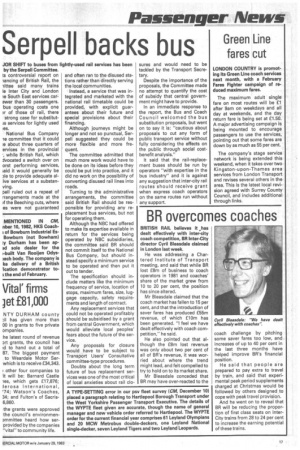Serpa backs bus
Page 19

If you've noticed an error in this article please click here to report it so we can fix it.
JOR SHIFT to buses from by the Serpell Committee. ts controversial report on lancing of British Rail, the iittee said many trains le Inter City and London ie South East services car: ewer than 30 passengers. bus operating costs one )r of those of rail, there strong case for substitutis services for lightly used 'as.
National Bus Company le committee that it could :e about three quarters of ervices in the provincial while British Rail, which dvocated a switch over on orst performing services, ;aid it would generally be )le to provide adequate alive services at a substanving.
pell ruled out a repeat of rrangements made at the rf the Beech ing cuts, where es were not guaranteed and often ran to the disused stations rather than directly serving the local communities.
Instead, a service that was integrated and marketed with the national rail timetable could be provided, with explicit guarantees about their future and special provisions about their financing.
Although journeys might be longer and not so punctual, Serpell suggested they could be more flexible and more frequent.
The committee admitted that much more work would have to be done on its ideas before they could be put into practice, and it did no work on the possibility of converting disused rail lines into roads.
Turning to the administrative arrangements, the committee said British Rail should be responsible for providing any replacement bus services, but not for operating them.
Although the NBC had offered to make its expertise available in return for the services being operated by NBC subsidiaries, the committee said BR should not commit itself to the National Bus Company, but should instead specify a minimum service to be operated and then put it out to tender.
The specification should include matters like the minimum frequency of service, location of stops, maximum fares, size, luggage capacity, safety requirements and length of contract.
Any replacement services that could not be operated profitably should be subsidised by a grant from central Government, which would alleviate local peoples' fears about the future of the service.
Any proposals for closure would have to be subject to Transport Users' Consultative committee-type procedures.
Doubts about the long term future of bus replacement services was one of the most critical of local anxieties about rail clo sures and would need to be tackled by the Transport Secretary.
Despite the importance of the proposals, the Committee made no attempt to quantify the cost of subsidy that central government might have to provide.
In an immediate response to the report, the Bus and Coach Council welcomed the bus substitution proposals, but went on to say it is: "cautious about proposals to cut any form of public transport service without fully considering the effects on the public through social costbenefit analysis."
It said that the rail-replacement buses should be run by operators "with expertise in the bus industry" and it is against any suggestion that inter-city rail routes should receive grant when express coach operators on the same routes run without any support.




















































































